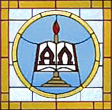 |

|
 |
Study 11: Life in Christ Introduction | Holiness | The Use of Force | Politics | Worldly Pleasures | Bible Study | Prayer | Preaching | Ecclesial Life | The Breaking of Bread | Marriage | Fellowship | Questions |
11.3.1 Bible StudyAfter baptism, we should bring forth "fruit unto holiness", living a life led by the Spirit rather than the flesh (Rom. 6:22; 8:1; Gal. 5:16,25). It is through God's Word abiding in us that we bring forth spiritual fruit (John 15:7,8). We have seen that we are led by the Spirit in the sense that God's Spirit is in His Word. Throughout our lives we must keep close to that Word through regular Bible reading and study. A thoughtful study of the Word results in a person realizing the need for baptism, and therefore performing that act. This process of letting the Word influence our actions and direct our lives should continue; baptism is but the first step in a lifetime of obedience to God's Word. There is a very real danger of familiarity with the Bible and the basic doctrines of the Gospel, leading us to a position in which the Word no longer influences us: we can read words and they have no practical effect upon us (see Appendix 2). For this reason it is wise to say a brief prayer before each reading of the Scriptures: "Open thou mine eyes, that I may behold wondrous things out of thy law" (Ps. 119:18). The Word of God should be our daily food — indeed, our dependence upon it, and natural desire for it, should be even greater than our instinctive appetite for physical food: "I have esteemed the words of his mouth more than my necessary food" was Job's feeling (Job 23:12). Jeremiah likewise: "Thy words were found, and I did eat them: and thy word was unto me the joy and rejoicing of mine heart" (Jer. 15:16). Making time during each day for regular Bible reading is therefore a vital thing to build into our pattern of daily life. An uninterrupted 30 minutes of Bible study first thing in the morning is bound to start us off each day in the right spiritual gear. Such faith-forming habits will be worth their weight in gold in the day of judgment. To avoid the natural tendency to only read those parts of Scripture which naturally appeal to us, Christadelphians have devised a programme of reading called "The Bible Companion" (available from the publishers of this book). This gives a number of chapters to be read each day, resulting in the New Testament being read twice and the Old Testament once in the course of a year. As we read the chapters day by day, we can take courage from the thought that thousands of other believers are reading the same chapters. Whenever we meet, we therefore have an immediate bond; the chapters which we have recently been reading should form the basis of our conversation. |